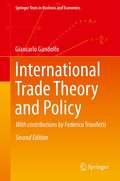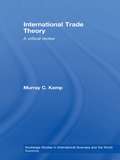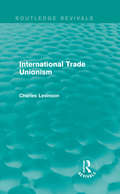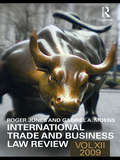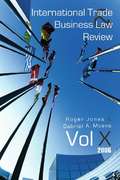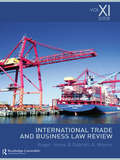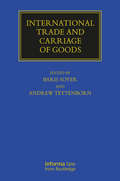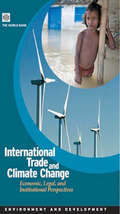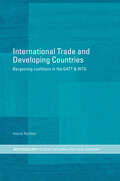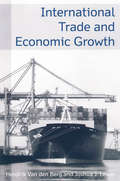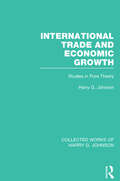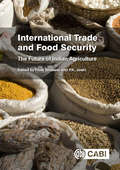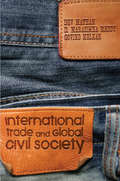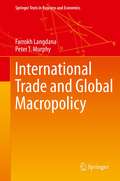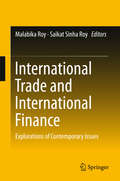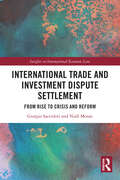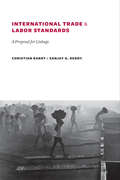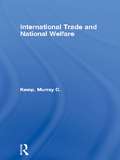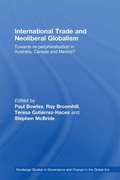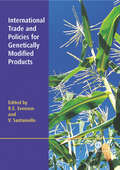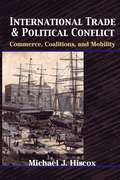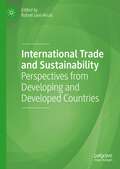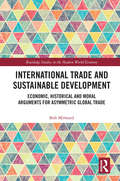- Table View
- List View
International Trade Theory and Policy
by Federico Trionfetti Giancarlo GandolfoIn the present text the author deals with both conventional and new approaches to trade theory and policy, treating all important research topics in international economics and clarifying their mathematical intricacies. The textbook is intended for undergraduates, graduates and researchers alike. It addresses undergraduate students with extremely clear language and illustrations, making even the most complex trade models accessible. In the appendices, graduate students and researchers will find self-contained treatments in mathematical terms. The new edition has been thoroughly revised and updated to reflect the latest research on international trade.
International Trade Theory: A Critical Review
by Murray KempMurray C. Kemp is one of Australia's foremost economists. He has held positions across the world including London School of Economics, U.C. Berkeley, Columbia University, McGill University, MIT, and latterly Macquarie University. Kemp was a Member of Council for the Econometric Society and was a Distinguished Fellow of the Economics
International Trade Unionism: International Trade Unionism (Routledge Revivals)
by Charles LevinsonAs Secretary General of the ICF and previously Assistant General Secretary of the IMF, Charles Levinson played an important part in developing the countervailing labour response to the multinational corporations. His earlier work, Capital, Inflation and the Multinationals (Routledge Revivals, 2013) displayed the force of his insight into the dynamics of modern economics and technology. First published in 1972, this book considers the opportunities which allow unions to command an increasing share in decisions that shape the worker’s destiny. Chapters include discussions on the multinational corporations, industrial democracy and the ideas behind collective bargaining.
International Trade and Business Law Review: Volume X
by Roger Jones Gabriël A. MoensThe International Trade and Business Law Review publishes leading articles, comments and case notes, as well as book reviews dealing with international trade and business law, arbitration law, foreign law and comparative law. It provides the legal and business communities with information, knowledge and understanding of recent developments in international trade, business and international commercial arbitration. The Review contributes in a scholarly way to the discussion of these developments while being informative and having practical relevance to business people and lawyers. The Review also devotes a section to the Willem C. Vis International Commercial Arbitration Moot and publishes the memoranda prepared by teams coached by Professor Gabriël A. Moens. The Review is edited at the Murdoch University School of Law in Perth, Australia. The Editors-in-Chief are Mr Roger Jones, Partner, Latham & Watkins LLP, Chicago and Gabriël A. Moens, Dean and Professor of Law, Murdoch Law School. It is an internationally-refereed journal. The Review is supervised by an international board of editors that consists of leading international trade law practitioners and academics from the European Union, the United States, Asia and Australia. The Student Editors for Volume XII are Sybil Almeida, Gianni Bei, Luke Rotondella, and Nicholas Summers from the Murdoch Law School.
International Trade and Business Law Review: Volume X
by Roger Jones Gabriël A. MoensCompiled by leading international trade law practitioners and academics from across the globe, this volume provides legal and business communities with information, knowledge and an understanding of recent developments in international trade, business and international commercial arbitration. Scholarly in style, this volume contributes to the discussions surrounding the developments whilst being informative and of practical use to the business community and lawyers. Covering the areas of international trade and business law, arbitration law, foreign law and comparative law, with one section devoted to the Willem C. Vis International Commercial Arbitration Moot, it contains: leading articles comments case notes book reviews. International Trade and Business Law Review is an invaluable resource for post-graduate students and business and legal professionals, primarily studying and working in the UK, USA and Australia.
International Trade and Business Law Review: Volume X
by Roger Jones Gabriël A. MoensThe International Trade and Business Law Review publishes leading articles, comments and case notes, as well as book reviews dealing with international trade and business law, arbitration law, foreign law and comparative law. It provides the legal and business communities with information, knowledge and understanding of recent developments in international trade, business and international commercial arbitration. The Review contributes in a scholarly way to the discussion of these developments while being informative and having practical relevance to business people and lawyers. It also devotes a section to the Willem C. Vis International Commercial Arbitration Moot and publishes the memoranda prepared by teams coached by Professor Gabriël A. Moens. The Review is edited at the Murdoch University School of Law in Perth, Australia. The Editors-in-Chief are Mr Roger Jones, Partner, Latham & Watkins LLP, Chicago and Gabriël A. Moens, Dean and Professor of Law, Murdoch Law School. It is an internationally-refereed journal. The Review is supervised by an international board of editors that consists of leading international trade law practitioners and academics from the European Union, the United States, Asia and Australia. The Student Editors for Volume XI are Adam Totaro and Peter Clay from the Murdoch Law School.
International Trade and Carriage of Goods (Maritime and Transport Law Library)
by Baris Soyer Andrew TettenbornThis book consists of edited versions of the papers delivered at the Institute of International Shipping and Trade Law’s 11th International Colloquium, held at Swansea Law School in September 2015. Featuring a team of contributors at the top of their profession, both in practice and academia, these papers have been carefully co-ordinated so as to ensure to give the reader a first class insight into the issues surrounding international sale and carriage contracts. <P><P>The book is set out in three parts: <P><P>Part I offers a detailed and critical analysis on emerging issues and unresolved questions in international sales and the carriage contracts affected to facilitate such sales. <P><P>Part II critically and thoroughly analyses the legal issues that often arise in the context of security over goods, letters of credit and similar documents. <P><P>Part III is dedicated to a critical and up-to-date discussion on matters concerning cargo insurance in this context. <P><P>With its breadth of coverage and high-quality analysis, this book is vital reading for both professional and academic readers with an interest in international trade and carriage of goods.
International Trade and Climate Change: Economic, Legal, and Institutional Perspectives
by World BankClimate change remains a global challenge requiring international collaborative action. Another area where countries have successfully committed to a long-term multilateral resolution is the liberalization of international trade. Integration into the world economy has proven a powerful means for countries to promote economic growth, development, and poverty reduction. The broad objectives of the betterment of current and future human welfare are shared by both global trade and climate regimes. Yet both climate and trade agendas have evolved largely independently through the years, despite their mutually supporting objectives. Since global emission goals and global trade objectives are shared policy objectives of most countries, and nearly all of the World Bank's clients, it makes sense to consider the two sets of objectives together. This book is one of the first comprehensive attempts to look at the synergies between climate change and trade objectives from economic, legal, and institutional perspectives. It addresses an important policy question - how changes in trade policies and international cooperation on trade policies can help address global environmental spillovers, especially GHG emissions, and what the (potential) effects of (national) environmental policies that are aimed at global environmental problems might be for trade and investment. It explores opportunities for aligning development and energy policies in such a way that they could stimulate production, trade, and investment in cleaner technology options.
International Trade and Developing Countries: Bargaining Coalitions in GATT and WTO (RIPE Series in Global Political Economy)
by Amrita NarlikarA keen analysis of how and why countries bargain together in groups in world affairs, and why such coalitions are crucial to individual developing nations. It also reveals the effects these negotiating blocs are having on world affairs. Successful coalition building has proven to be a difficult and expensive process. Allies are often not obvious and need to be carefully identified. Large numbers do not necessarily entail a proportionate increase in influence. And the weak have the choice of teaming up against or jumping on the bandwagon with the strong. Even after it has been organised, collective action entails costs of many kinds. This book investigates the relevance and workability of coalitions as instruments of bargaining power for the weak. More specifically, this analyzes the coalition strategies of developing countries at the inter-state level, particularly in the context of international trade. Given the nature of this enquiry, this new study uses theoretical and empirical methods to complement each other. The theoretical approach draws from a plethora of writings: formal theories of clubs and coalitions, theories of domestic political economy and theories of international relations. The empirical analysis of comparable coalitions becomes necessary to assist in this theorising, so the greater part of the book focuses mainly (though not exclusively) on coalitions involving developing countries on the issue-area of trade in services. Through the case-studies of the Uruguay Round and an analytical overview of more recent coalitions, this text fills an important gap in the literature of international political economy and international relations where most GATT/WTO-based coalitions have eluded record. This book will be of great interest to all students of international relations, politics and globalization.
International Trade and Economic Growth
by Van den Hendrik Joshua J LewerUnlike any other text on international trade, this groundbreaking book focuses on the dynamic long-run relationship between trade and economic growth rather than the static short-run relationship between trade and economic efficiency. The authors begin with well-known theory on international trade, and then take the student into more recent and less well-known work, all with a careful balance between empirical and theoretical perspectives. A valuable teaching tool for courses in international economics, economic growth, and economic development at both the undergraduate and graduate levels, the book uses some very modest algebra, calculus, and statistics. However, most analytical discussions are built around diagrams in order to make the text accessible to students with a variety of social science backgrounds. An Instructor's Manual is available to professors who adopt the text.
International Trade and Economic Growth: Studies in Pure Theory (Collected Works of Harry G. Johnson)
by Harry G. JohnsonThe studies collected in this volume embody the results of research conducted in the mid 1950s into various theoretical problems in international economics. They fall into three groups – comparative cost theory, trade and growth and balance of payments theory. This volume consolidates the work of previous theorists and applies mathematically-based logical analysis to theoretical problems of economic policy.
International Trade and Food Security: The Future of Indian Agriculture
by Floor Brouwer P. K. JoshiThis book explores structural changes in India's agrifood systems during the next ten to twenty years. The dynamics in the agrifood sector is explored in the context of the overall economy, taking into account agricultural and trade policies and their impacts on national and global markets. The contributors draw on qualitative and quantitative approaches, using both a national model - to focus on urban-rural relations and income distribution - and an international model to focus on patterns of economic growth and international trade.
International Trade and Global Civil Society
by Dev Nathan D Narasimha Reddy Govind KelkarThis study challenges the dominant tendency of civil society to negate international trade as such. The authors argue that it is necessary to frame differentiated trade rules based on levels of economic development, and also to shift from subsidies to shore up uncompetitive livelihoods to productivity-enhancing investments.Most importantly, the book ends with a case for trade unions, women's organizations and other civil society organizations to imagine and create themselves as being global -- in order to take up the challenge of strengthening global countervailing power to capital.
International Trade and Global Macropolicy
by Farrokh Langdana Peter T. MurphyIn the curricula of highly ranked MBA programs, two areas of discussion are conspicuously absent: International Trade, and Global Macroeconomic Policy. In this post-financial crisis environment, as the US and other advanced economies continue to experience sluggish growth, persistently high unemployment, and political agitation for increasingly protectionist policies, discussions pertaining to trade, currencies, and international capital flows are often fraught with emotion, tension, and hysteria. This book cuts through the emotions and superficial "solutions" and provides the reader with a thorough understanding of the hard-hitting theoretical models that drive the global flow of goods, services, and capital in the real world. A key feature of this volume is the presentation of the theoretical models, and the discussion of their implications in the context of real-world applications. This text is uniquely designed for current and future business leaders who are, or will be, engaged in the global economy. Armed with an understanding of the theoretical underpinnings driving goods, capital and ideas across national boundaries, readers will learn to anticipate the effects of trade and macroeconomic policy changes, and will have the tools to make sound, informed decisions for themselves and their global organizations.
International Trade and International Finance
by Malabika Roy Saikat Sinha RoyThis book brings together a collection of papers on international trade and international finance, instead of treating the two as disjoint fields of study. The volume, while focusing on the recent developments and frontiers of research in international trade and international finance, also emphasizes the inherent integrated nature of the two subjects; some of the papers are overlapping across the two areas. A unique feature of the proposed volume is that it unravels some new issues in addition to re-examining certain old issues in a new perspective and thus covers wide ranging issues with an emphasis on policy. The book covers issues mostly relating to emerging market economies, which has increasingly assumed importance in the context of globalization. The book contains some survey papers covering the frontiers of current knowledge on important themes like recent developments in trade theory and empirics, foreign exchange market, institutions in trade and finance, interrelation and interaction between international trade and international finance. The papers, fruit of rigorous and original research, are written by internationally and nationally reputed authors along with promising young researchers on the subjects. The book substantially contributes to the growing literature on issues relating to trade and international finance in emerging market economies and extends the frontiers of knowledge. The book is expected to have the widest possible readership comprising of advanced undergraduate and graduate students as well as senior researchers working in international trade and international finance.
International Trade and Investment Dispute Settlement: From Rise to Crisis and Reform (Insights on International Economic Law)
by Giorgio Sacerdoti Niall MoranThis book provides a thorough comparative analysis of the trade dispute settlement system of the WTO, Regional Trade Agreements, and of Investor–State Dispute Settlement (ISDS).Reviewing in parallel their origins, features, development, and current challenges, highlighting commonalities and differences, the book analyzes criticisms leveled against both regimes, explores current reform efforts at the WTO, ICSID, and UNCITRAL (including the controversial proposal to replace ISDS with a Multilateral Investment Court), and engages in the on-going debate by evaluating possible outcomes. As to trade, the book highlights the WTO system's successful operation for more than 20 years and its hobbling functioning since the paralysis of the Appellate Body in 2019. As to ISDS, the book details the procedural protection granted to foreign investors under Bilateral Investment Treaties (BITs), other International Investment Agreements and investment chapters of trade agreements such as NAFTA, USMCA, CETA, and the CPTPP, alongside the impact of case law on the regulatory space of states.This authoritative book intends to serve as a fundamental reference for students and researchers in international investment and trade law, as well as for international lawyers, adjudicators, and diplomats involved in dispute settlement.
International Trade and Labor Standards: A Proposal for Linkage
by Sanjay G. Reddy Christian BarryIn this book, Christian Barry and Sanjay G. Reddy propose ways in which the international trading system can support poor countries in promoting the well-being of their peoples. Reforms to the trading system can lessen the collective-action problem among poor countries, increasing their freedom to pursue policy that better serves the interests of their people.
International Trade and Labor Standards: A Proposal for Linkage
by Christian Barry Sanjay ReddyProgressive governments in poor countries fear that if they undertake measures to enhance real wages and working conditions, rising labor costs would cause wealthier countries to import from and invest elsewhere. Yet if the world trading system were designed to facilitate or even reward measures to promote labor standards, poor countries could undertake them without fear.In this book, Christian Barry and Sanjay G. Reddy propose ways in which the international trading system can support poor countries in promoting the well-being of their peoples. Reforms to the trading system can lessen the collective-action problem among poor countries, increasing their freedom to pursue policy that better serves the interests of their people. Incorporating the right kind of linkage between trading opportunities and the promotion of labor standards could empower countries, allowing them greater effective sovereignty and enabling them to improve the circumstances of the less advantaged. Barry and Reddy demonstrate how linkage can be made acceptable to all players, and they carefully defend these ideas against those who might initially disagree. Their volume is accessible to general readers but draws on sophisticated economic and philosophical arguments and includes responses from leading labor activists, economists, and philosophers, including Kyle Bagwell, Robert Goodin, Rohini Hensman, and Roberto Mangabeira Unger.
International Trade and Money (Routledge Library Editions: International Finance #2)
by Alexander K. Swoboda Michael B. ConnollyThis book, first published in 1973, presents a collection of original contributions to the analysis of international trade and monetary relations by a number of distinguished economists. The papers bear on six topics in trade theory: the inadequacies of classical trade theory, customs unions, immiserising growth, the international transmission of technical change, multinational company behaviour, and comparative trends in income distribution. Chapters dealing with international monetary relations focus on general equilibrium analysis of spot and forward exchange markets, money supply analysis in open economies, devaluation in developing countries, the sharing of the burden of international adjustment, the monetary approach to balance-of-payments theory, and the integration of Keynesian and monetary approaches to international adjustment. Taken together, they summarize much of the most advanced contemporary research in international economics. The volume is unified by the contributors' common belief that economic theory can help solve important and relevant problems in international economic relations. All the contributions represent original work on the frontiers of research in international economics, but they use simple and understandable techniques to reach their conclusions.
International Trade and National Welfare (Routledge Studies in the Modern World Economy #Vol. 32)
by Murray C. KempWhen can a country be said to benefit from free trade?This question has obsessed economists for more than 200 years, and a definitive answer has never been provided. Continuing the influential work begun in The Gains from Trade and the Gains from Aid, (Routledge 1995), Murray Kemp here presents the recent progress he and his co-workers have made in tackling this important question.
International Trade and Neoliberal Globalism: Towards Re-peripheralisation in Australia, Canada and Mexico? (Routledge Studies in Governance and Change in the Global Era)
by Paul Bowles Ray Broomhill Teresa Gutiérrez-Haces Stephen McBridInternational trade must be analysed within the historical context within which it occurs. Behind the statistics on trade flows lie power structures, class interests and international hierarchies. These change over time and how countries respond to them has critical implications for their citizen’s well-being. In this book, the history of trade in Australia, Canada and Mexico is analysed. Trade agreements are analysed in detail to explore the new forms that dependence and subordination have taken. Arguing that the free trade agreements are significantly biased in favour of the United States, the contributors analyse how each of the three countries are being subject to specific forms of re-peripheralisation and examine possible alternatives for a progressive future based on an integration in the global economy which enhances, rather than limits, democracy and social justice. By providing an historical and critical account of trade policy in the three countries, the book provides a welcome antidote to the ahistorical accounts of free trade supporters.
International Trade and Policies for Genetically Modified Products
by Vittorio Santaniello Robert E. EvensonThere are a number of controversial issues that surround agricultural biotechnology and genetically modified products. International trade and policies are at the forefront of these controversies. This book addresses these issues and has been developed from a meeting of the International Consortium on Agricultural Biotechnology Research, held in Revello, Italy, in July 2004. It covers five themes: analytical studies, empirical trade studies, spillover dimensions, intellectual property rights and applied general equilibrium trade models.
International Trade and Political Conflict: Commerce, Coalitions, and Mobility
by Michael J. HiscoxThis book unveils a potent new approach to one of the oldest debates in political economy--that over whether class conflict or group competition is more prevalent in politics. It outlines the conditions under which one type of political conflict is more likely than the other. It focuses on a critical issue affecting support for and opposition to free trade--factor mobility, or the ability of those who own a factor of production (land, labor, or capital) to move it from one industry to another.
International Trade and Sustainability: Perspectives from Developing and Developed Countries
by Rafael Leal-ArcasThis book examines how international trade can be utilised to build a sustainable future. It highlights how international trade and climate regimes can work together to put in place a Green New Deal. The potential of mega-regional trade agreements to aid climate change mitigation and power the energy transition is explored in relation to the energy section, with a particular focus on clean technology. Broader perspectives are provided by an analysis of international trading systems in the Caribbean and Pacific Islands and a review of climate change law and policy in Brazil, Russia, India, and China. This book aims to provide an interdisciplinary understanding of how green trade can be achieved. It will be relevant to researchers and policymakers interested in international trade and environmental economics.
International Trade and Sustainable Development: Economic, Historical and Moral Arguments for Asymmetric Global Trade (Routledge Studies in the Modern World Economy)
by Bob MilwardThe contemporary orthodox view of world trade has centred, generally unchallenged, on the ideas of free trade, based on the theoretical construct of comparative advantage. This book will engage in a critique of the orthodox position based on the underlying theoretical economic construct, the historical development of the now developed economies and the morally unsustainable position of the free-trade regime. The author examines alternatives such as Most Favoured Nation and Preferential Trading Agreements before making the argument in favour of Asymmetric Trading, where the underdeveloped economies can develop behind tariff barriers and quotas, whilst the triadic nations maintain a lack of barriers to the exports of these economies. He outlines how such a trading regime would be mutually beneficial in the long term, in the sense that development through industrialisation takes place and the increase in GDP per capita would allow markets for exports to be sustainable, thus widening the market for the goods and services of the developed economies. However, the author demonstrates that free trade actually increases the development gap by maintaining the status quo in terms of the underdeveloped economies specialising in and exporting low value-added primary products and importing high value-added manufactures. The book analyses contemporary and historical data to illustrate how an alternative trading regime can be truly advantageous to both the developed and underdeveloped regions of the world: a global trading regime that is capable of increasing GDP in a sustainable manner without transferring a surplus from the poor to the rich nations and without a long-term commitment on the part of the developed nations to altruism.
